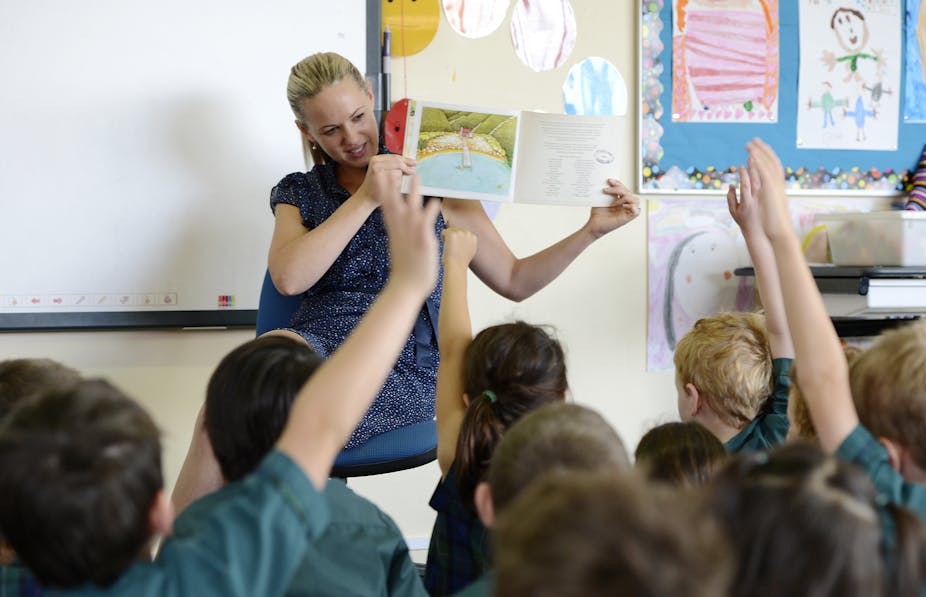Barely a day goes by when people aren’t bemoaning the state of teacher education in Australia. Australian students’ results are declining, entry requirements for teachers aren’t high enough, teaching courses don’t focus on the right things.
So whose fault is it? And how do we rectify the situation? It’s true that teacher education providers select too many students who would never have gained entry to teacher education in the past, but this is merely a symptom of a deeper problem.
The problem lies in the status and salary prospects of teachers, and the quality of teacher education providers. Countries where student achievement is highest have a heavy focus on recruitment and entry standards of teachers, accreditation standards and registration standards. Australia is weak in all three of these areas.
Recruitment and entry standards
Only 21.5% of students offered a teaching place this year had an ATAR above 80, compared with an average of well over 50% across all other university programs (and nearly 70% for science and engineering).
High-achieving countries make sure that salaries and conditions attract sufficient future teachers from the top 20-30% of secondary school graduates. Australia is not doing enough to assure similarly high-quality recruitment.
Student surveys clearly show that long-term salary prospects and status are the main reasons that many more able students do not choose teaching, even though they regard it as an important profession.
Academic ability is important since high-quality teaching is intellectually demanding. Research shows that verbal ability and scores on scholastic aptitude tests relate to eventual teaching effectiveness. Candidates with strong academic qualifications are more likely to be effective teachers, as measured by growth in students’ test scores. The ability to apply effective teaching methods depends on deep understanding of what is being taught.
Salaries matter. Recent research shows that it is the salaries of experienced teachers relative to other professions that distinguish countries with higher student achievement.
An Australian teacher’s salary at the top of the scale is 1.30 times the GDP per capita, making it among the lowest in OECD countries, where the average is 1.65. Teachers in South Korea are paid at the 78th percentile in their country’s wage distribution, and rise to well over two-and-a-half times the starting salary. Those in Australia are paid around the 50th percentile and rise to less than one-and-a-half times starting salaries.
Whereas maximum teacher salaries in Australia are about 20% below the OECD average, salaries in Canada are about 20% higher. Salaries for experienced teachers in Singapore rise to nearly double the OECD average.
A realistic goal for Australia would be to lift salaries for proven accomplished teachers to at least the OECD average. Australia will not match the quality of teacher education graduates in high-achieving countries unless concerted policies are in place to enable teaching to compete with other professions and attract most entrants from the top third of the age cohort.
Accreditation: who trains teachers?
High-achieving countries are very fussy about who gets to train teachers. They usually have a single national agency responsible for assessing and accrediting teacher education programs. England has one strong agency focusing on a range of program outcomes.
Australia has eight accreditation bodies, several of which are only responsible for one provider. Like most other professions, teaching should have one independent expert body.
Australia undoubtedly has teacher education programs equal to the best internationally. However, the current accreditation system is weak. It lacks the capacity to conduct valid and independent evaluations of Australia’s 400 programs, meaning we don’t have enough information about the effectiveness of them.
We lack information on the knowledge graduates have about the subjects they will be expected to teach, whether they are aware of the latest research in teaching methods, and what core teaching skills they have mastered.
Registration: who gains full entry to the profession?
Graduation is an important step. However, for most professions, registration is also a critical quality assurance measure. High-achieving countries require a mentored induction for teachers coupled with rigorous assessments of readiness before full entry to the profession.
The rigour of current procedures varies widely across Australian states and territories. Australia needs to build a rigorous and nationally consistent registration system for assuring the quality of entrants to the teaching profession.
The present situation where our brightest students shun teaching for higher-paid and more-respected careers is one we have brought upon ourselves. Unlike high-achieving countries, Australia has no specific policies in place to lift the status of teaching and ensure that it is as attractive a career option for our ablest students as other professions.
Although Australia has been spending more money on education, it has not been investing in what matters long term: making teaching more attractive to our ablest graduates, using more rigorous methods to assess teacher education programs and setting a high bar for entrance to the profession.

